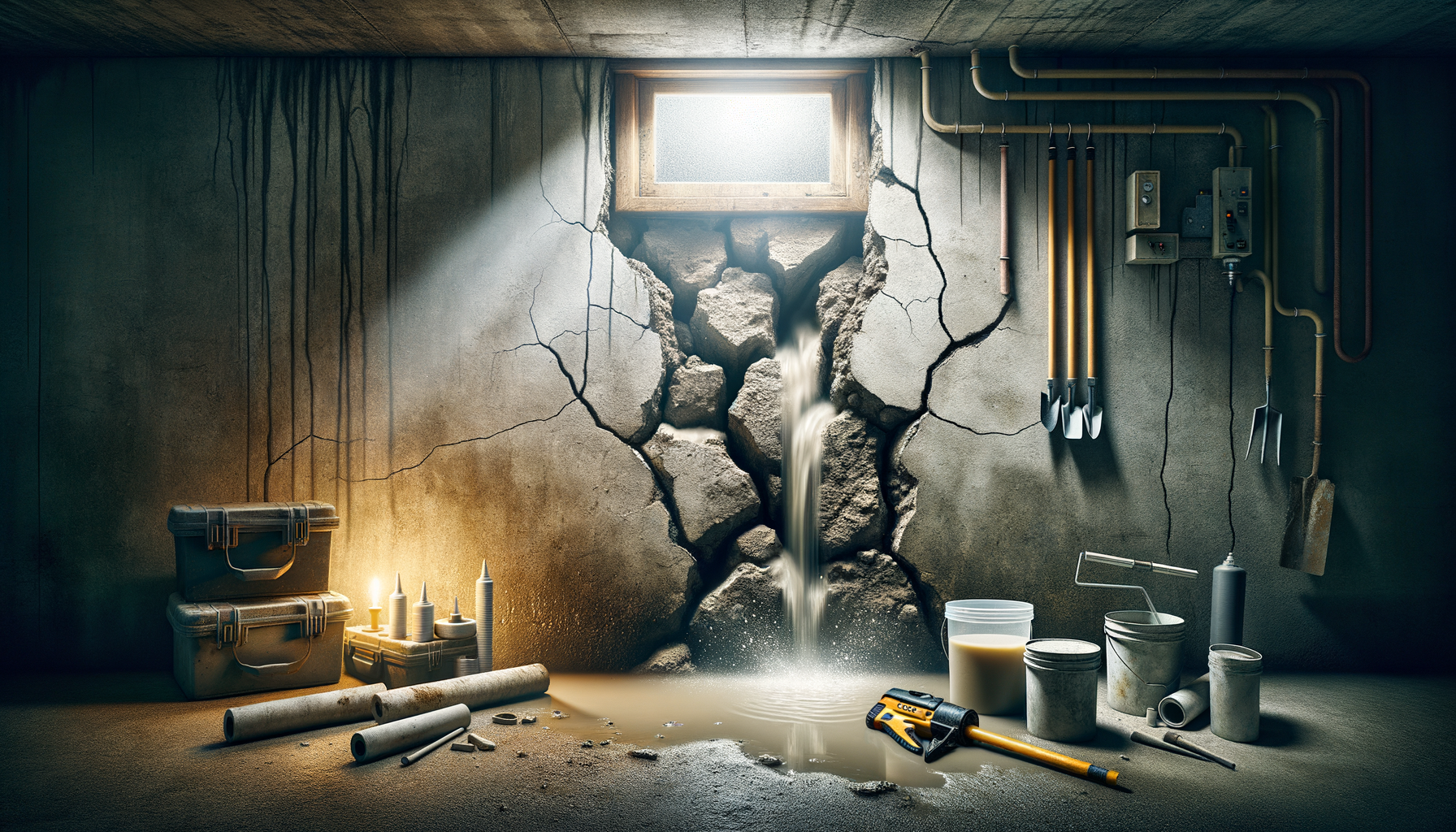Why Do Basement Walls Get Damaged?
Water Getting In
Water getting into your basement walls is a common problem. It can get in through cracks and joints, causing damage over time. If your yard doesn’t drain well, heavy rains or high water levels can make this worse, leading to mold, dampness, and white, powdery spots called efflorescence.
Pressure from the Soil
The soil around your house changes size when it gets wet or dries out. This can push against your basement walls, making them crack or bow inward. If not fixed, this pressure can cause big problems for your home’s structure.
Bad Construction
If your house wasn’t built well, you might end up with weak basement walls. Using poor-quality materials, not curing the concrete properly, or not reinforcing the walls can all lead to damage that needs fixing.
Foundation Settling
As your house settles over time, the foundation can shift. This can cause cracks and other problems in your basement walls, especially if the soil isn’t stable.
Signs Your Basement Walls Need Fixing
Cracks in the Walls
Different cracks can mean different problems:
- Horizontal Cracks: Often caused by soil or water pressure.
- Vertical Cracks: Usually from the house settling.
- Stair-Step Cracks: Found in brick or block walls, showing the wall is shifting.
Bowing Walls
If your basement walls are curving inward, that’s a big sign of trouble. Soil or water pressure might be pushing against the wall, and you need to fix it fast.
Water Stains and White Spots
Water stains and white, powdery spots (efflorescence) on the walls mean water is getting through. This shows that you need to repair the walls to stop the water.
Dampness or Mold
If your basement is always damp or has mold, water is getting in. This damages the walls and is bad for your health, so it needs fixing.
Foundation Shifting
If your basement walls or floor are out of place, your foundation might be in trouble. This needs professional repair.
DIY Basement Wall Repair Tips
Sealing Small Cracks
You can seal minor cracks yourself. Here’s how:
- Materials Needed: Crack filler, epoxy kit.
- Steps:
- Clean out the crack.
- Apply the filler or epoxy.
- Let it dry and cure fully.
Using Wall Anchors
Wall anchors can help fix bowing walls:
- How They Work: They connect the wall to the outside ground to stabilize it.
- Installation:
- Drill holes for the anchor rods.
- Insert and secure the anchors.
- Tighten the anchors to straighten the wall.
Using Hydraulic Cement
Hydraulic cement seals cracks well:
- What You Need: Hydraulic cement, trowel, water.
- How to Do It:
- Mix the cement.
- Press it into the crack with a trowel.
- Let it cure fully.
When to Call a Professional
Big Cracks
If cracks are wider than 1/4 inch or horizontal, get a professional.
Major Bowing
If your walls bow more than 2 inches, call an expert.
Ongoing Water Problems
If water keeps getting in despite your efforts, you need professional help.
Structural Problems
If your foundation shifts or keeps cracking, get a professional evaluation.
Professional Repair Methods
Epoxy and Polyurethane Foam
These methods seal cracks strongly and flexibly, preventing water damage.
Carbon Fiber Straps
These reinforce and stabilize walls, stopping further bowing or cracking.
Steel I-Beams
For severe problems, steel beams can provide strong support.
Fixing Soil Issues
Techniques like slab jacking or soil nailing can fix problems with the soil that cause wall damage.
Waterproofing
Pros can install systems to keep your basement dry from inside and out.
Preventing Future Damage
Good Grading
Make sure the ground slopes away from your house to keep water away.
Clean Gutters
Keep your gutters clean and make sure water flows away from your house.
Waterproofing
Use waterproof paints or membranes to seal your walls.
Regular Checks
Regularly inspect your walls to catch problems early.
Landscaping
Manage plants and water flow around your home to protect the foundation.
Common Questions About Basement Wall Repair
Can All Cracks Be Fixed by Homeowners?
Small cracks can often be fixed yourself, but bigger ones need a pro.
How Much Does Professional Repair Cost?
In Canada, repairs can cost from $2,000 to $20,000.
What’s the Best DIY Fix for Minor Water Problems?
Waterproof paint or a dehumidifier can help with small water issues.
By knowing what causes basement wall damage and recognizing the signs, you can make smart choices to keep your home safe. Whether you fix minor problems yourself or call the professionals for bigger issues, it’s important to take care of your basement walls.


Leave a Reply